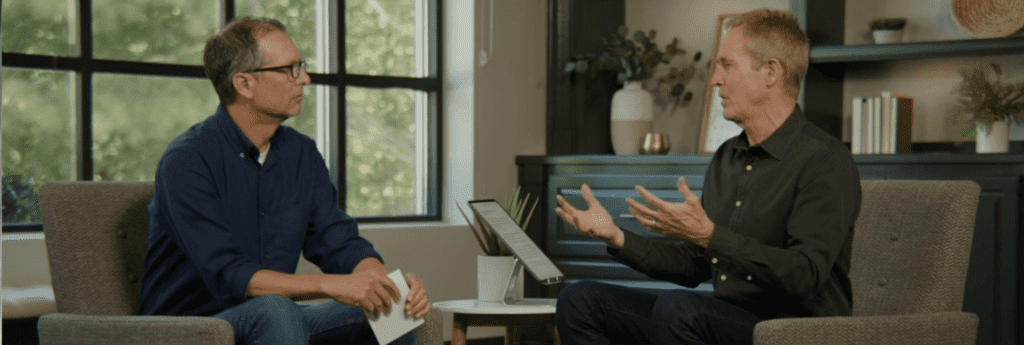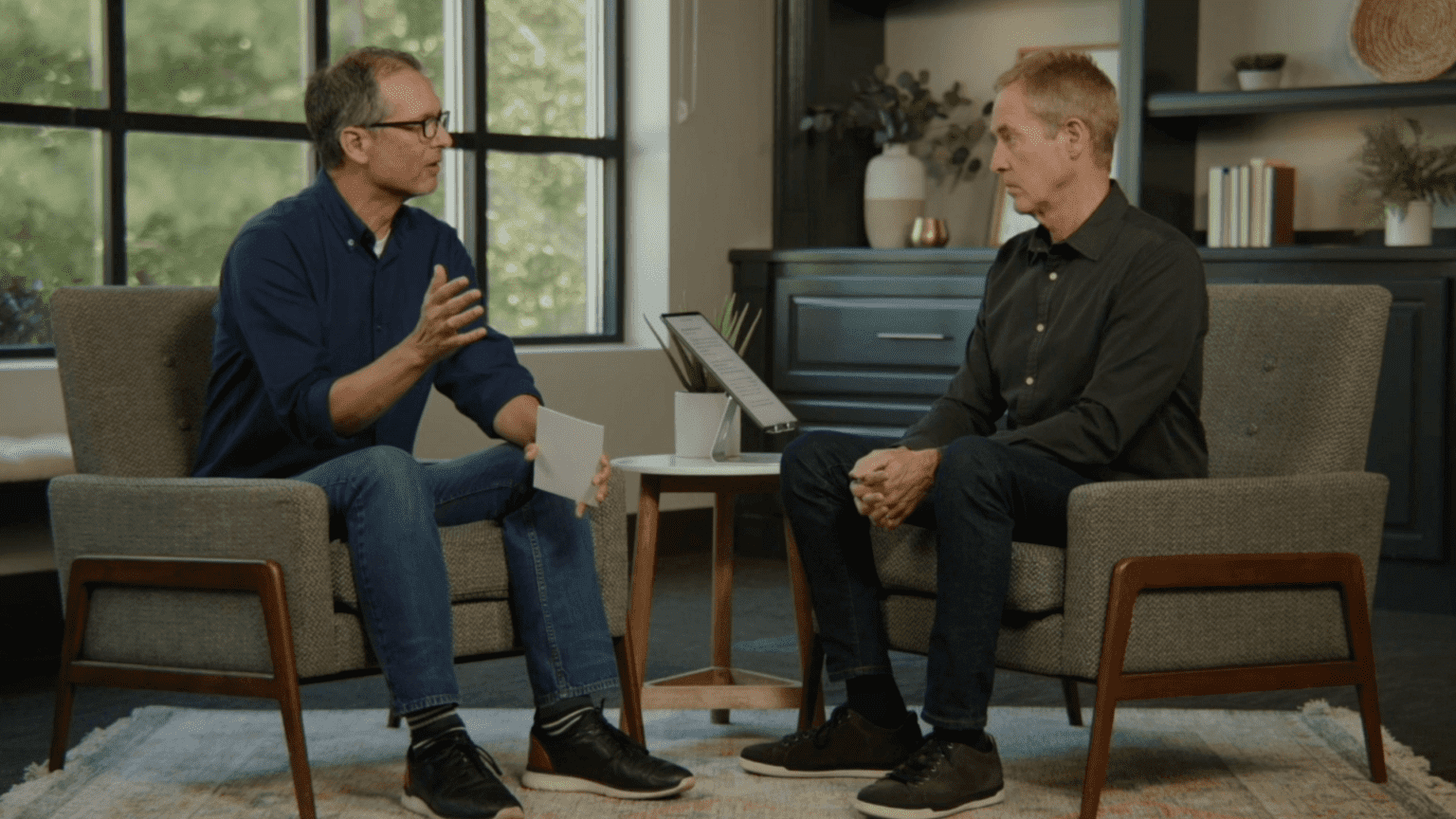I recently had the opportunity to sit down with my pastor and friend Andy Stanley, Lead Pastor of North Point Community Church and host of the Andy Stanley Leadership Podcast, for a candid conversation on leading a church in the midst of the political and cultural divisions that are impacting churches across the country.

I interviewed Andy on topics like being a church for the unchurched, navigating political divides in our congregation, living and leading from the messy middle, and how churches can break through the noise of social media and the news. I hope it provides some encouragement for pastors leading in this difficult season.
Here are some of the highlights from that conversation:
Tony: You’ve been in ministry a little longer than I have, but it feels like churches are dealing with more division than I’ve witnessed in my lifetime. What’s your perspective? What’s distinctive about today that may be contributing to that division?
Andy: I’ve never seen anything like it, and obviously it’s the combination of several things: COVID, racial tension, and then of course all the political things that are going on. I’m hearing it from pastors all the time, and we’re all kind of looking for a solution. Unfortunately it’s probably a tension that we manage rather than a problem to be solved. And now with social media, everybody has a microphone and an opinion. There’s misinformation and everyone is a victim of cognitive bias and confirmation bias.
Tony: The communities where North Point is located have grown to be very diverse. That has to make it challenging to reach and minister to a diverse mission field. How has that dynamic changed especially in recent years of your ministry?
Andy: With all the division within culture, and specifically in [Atlanta] or any really Metro area, people come to church with their guard up, or with their new informed opinion and their politics on the front burner. Suddenly those filters, whether it’s the COVID filter, the vaccine filter, the political filter, the racial filter, all of these filters now are sitting right in front of people. And all my sermons are being filtered through multiple filters.
Tony: Does that make it harder or easier for you to accomplish your mission as a church?
Andy: I am more sensitized to what I don’t want to accidentally say, or I don’t want to accidentally say it in a way that’s accidentally offensive. So if I think a message is going to be somewhat controversial or could be taken the wrong way, I’ll bring people from our staff that I think are part of the demographic that could take it the wrong way and say, “Hey, here’s the outline. Let’s talk about it. I want to get this right.” In terms of our mission to attract unchurched people or to engage unchurched people with the Gospel, I don’t know if it’s more difficult or not. What makes it more difficult for some is the pre-existing bias against church in general, and especially against large churches in general, that’s always been there, and perhaps the division and culture has made that more of an obstacle.
You know our line is “we want to create churches unchurched people love to attend,” and we want to engage unchurched people with the Gospel, so that means, that verse from Acts 15: let’s not make it difficult for people who are turning to God. Well, the way you don’t make it difficult is you remove every unnecessary obstacle… and I think we’re constantly identifying new obstacles that we need to be sensitive to, if we’re really committed to being the kind of church we say we are.
If we want to engage unchurched people with the Gospel, let's not make it difficult for people who are turning to God. We're constantly identifying new obstacles that we need to be sensitive to. Click To TweetTony: Let’s talk specifically about politics and Covid. Having heard some of your comments in recent months, it sounds like you are taking hits from both sides of the spectrum. How has that impacted you, and how have you responded?
Andy: This is the first time a lot of people have chosen to leave for the same reason, and the disturbing thing is it has nothing to do with theology. It has nothing to do with the mission of the church or the style of worship, or any of the environments, any of the things you would normally complain about. I had personal conversations with many of the people who were leaving and the conversation would become political 100% of the time. It wasn’t, “We missed church.” It was, “We don’t trust why you have decided to close Sunday morning worship services and it became political.” And that was discouraging.
Tony: So North Point is a church that unchurched people love to attend, but some churched people…not so much? 🙂
Andy: Well you mention that—it’s really amazing how many new families I’m seeing walk in the door every Sunday. And many times it’s people moving from different areas or experiencing something in their life, a crisis of some sort, where they just recognize “I need church” and they’re coming to the doors and bringing their kids. And it’s just been phenomenal. I’ve really been surprised. I thought on this side of COVID, what we would experience is church people coming back, but what I’m seeing is just new people.
Tony: I’ve talked with several pastors who have had close friends leave their churches over Covid guidelines and politics in the last year. What are the long-term effects of people picking churches based on their political leanings rather than a commitment to fulfilling our mission as the Body of Christ?
Andy: Well, I’ve had these conversations with pastors, like you have, and I’ve just said to them: “You’re doing the right thing. This is not a problem you can solve, this is a tension you’re going to have to manage and you are going to have to stay right in the middle.” So, when I addressed this specific issue this past summer to all of our churches, I said: “For those of you who want us to take a stand, here it is. This is our stand: we’re standing right in the middle.”
The context was Philippians 2: Jesus came to be a servant. Jesus gave his life. He never powered up, he never played the God card, he did not come into this world to win, he came into this world to lose. And the moment the church begins to play, to win, we have already lost because the only way to win in this world is to adapt the instruments or the methods of the kingdoms of this world.
Jesus came to be a servant. Jesus gave his life. He never powered up, he never played the God card—he did not come into this world to win, he came into this world to lose. Click To TweetThe call of the local church is to address the hearts of men and women, rather than drop down into a realm where we’re just going to be used, where we are going to become a voting block, or to become a constituency… For the body of Christ to allow itself to be used by either side politically, we’ve lost our voice and ultimately we’ve lost our opportunity to become the conscience of the nation. For us to be the conscience of the nation, we have to stand above politics and speak to the hearts of people on both sides. And I just feel like what we’ve just come through–we’ve lost some of that opportunity.
Tony: So, let’s try to get to the solution side of this topic. Paul was pretty clear with the church in Corinth that we should “agree with one another,” that there should be “no division,” and that we should be “perfectly united in mind and thought.” As pastors and leaders, how do we help churches experience unity when there’s so much division in our world?
Andy: We have to help the people in our church identify the enemy. The enemy of the local church is division—period. That’s the enemy. Anything that facilitates division is the enemy. Anything that facilitates unity is our friend. To help the world understand that God sent Jesus is our unity— period. Jesus could have prayed for anything else for future generations of his followers. He prayed for unity. So when a local church understands that enemy number one is disunity, they will be unified, they’ll have a voice. And they will be able to make a difference in the culture.
Watch the full interview where Andy and I dive into preaching and teaching that promotes unity, breaking through the noise of news and social media, balancing grace and truth, and more:
Tony: I’m naturally more of a realist than an optimist, but, for whatever reason, I think this could be a real moment for the church. I think our message could be disruptive in a good way in today’s very divided world. Do I have reason to have hope?
Andy: Nobody likes the division except the people who profit from it, but the people who profit from it have the mailing list and the microphones. But there are multiple people in culture who are saying: let’s move toward the middle because the middle is where problems are solved. The middle is where life experiences are shared. The middle is where we go. So yeah, there’s hope.
And if the church will step back into its role as people who serve immediate needs immediately, and speak to issues and matters of the heart and create a safe place for people from all political persuasions to come together, it’s the opportunity of a lifetime. In fact, it may be our greatest opportunity, because where else will people from different sides of the political aisle be able to come together and do anything together and have conversations?
If the church will step back into its role and speak to issues and matters of the heart and create a safe place for people from all political persuasions to come together, it's the opportunity of a lifetime. Click To TweetThe thing that makes this so difficult is to keep my faith filter ahead of my political filter. And we often think we’re doing this well. But when I can’t love my enemy, when I can’t speak well of my enemy, when I’m unwilling to find common ground with an enemy, or a political opponent, or somebody who doesn’t see the world the way I do, clearly my faith filter is not my first filter.
Tony: Because of the challenges we’ve experienced in recent months, I know many pastors are feeling defeated and many are considering whether or not they want to stay in ministry. What encouragement would you give pastors and church leaders in this season…especially those who are leading divided churches?
Andy: Pastors, if you’re feeling that tension, you are probably right where you need to be. Stay there. This is a “for such a time as this” moment, and we are called to stay firm. I think ultimately, it’ll pay off—I don’t know what the payoff is, but ultimately that’s what faithfulness and faithful ministry looks like right now. And so that’s what we’re called to do.
Pastors, if you're feeling the tension, you are probably right where you need to be. Stay there. This is a “for such a time as this” moment, and we are called to stay firm. Click To TweetYou just trust God that on the other side, something good will come about, either in your lifetime or maybe in the future. But faithfulness in this for pastors right now, I believe, is staying the course, fixing our eyes on Jesus, trying to help the people in our church, regardless of their political persuasion, to fix their eyes on Jesus and to allow him to shape our behavior and shape our responses to the world around us. And then if Jesus is correct, and I always believe Jesus is correct, we will let our light shine in such a way that people will see our good deeds and ultimately look up and glorify our father in Heaven.








One Comment
Dear Tony and Andy, your perspective is also political even though you may think it isn’t. Also, who defines what the middle is or what is divisive. Whether we like it or not, every opinion in this interview is completely subjective.